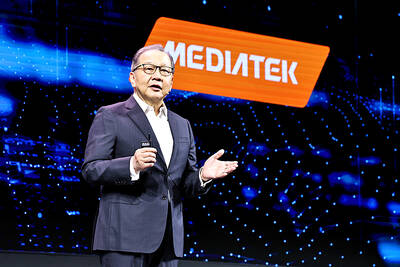Nearly 50 percent of German companies based in Taiwan remain positive about their operations, despite rising uncertainty, but said that a lack of skilled workers might become a serious threat, a survey released yesterday by the German Trade Office Taipei showed.
Forty-nine percent of respondents depicted their business in Taiwan as “good,” higher than 43 percent in South Korea, 42 percent in China and 36 percent in Japan, the office said, citing a global survey of the German Chambers of Commerce Abroad conducted in March and last month.
“The findings confirm that German companies remain positive about their business and look to the future with optimism,” German Trade Office Taipei chief representative and executive director Axel Limberg said.
While optimism in some other major Asian markets has weakened due to heightening downside risks, it has remained strong in Taiwan, Limberg said.
Only 7 percent of German companies in Taiwan expect their business operations to deteriorate over the next 12 months, he said.
Optimistic business sentiment gives the firms a higher willingness to invest in Taiwan, compared with other markets in the region, he said.
More than 36 percent said that they would increase investment in Taiwan in the next 12 months, while 49 percent would stand by their original investment plans, the survey showed.
That is higher than 28 percent of German companies in China that intend to raise stakes, 22 percent in South Korea and 19 percent in Japan, it showed.
The outlook is consistent with expectations of economic growth in Taiwan, it showed.
The survey also revealed ongoing and potential challenges.
The war in Ukraine is negatively affecting German firms, with 70 percent saying they expect costs to rise, Limberg said.
Sixty-eight percent believe that global supply chain disruptions have affected their operations, he said.
In addition, a lack of skilled workers continues to put pressure on nearly 50 percent of companies, which call it a serious threat to their operations, he added.
“We hope the Taiwanese government will address this issue with full commitment sooner [rather] than later,” he said, adding that the office is ready to work with the government and jointly explore solutions to meet the challenges.

Japanese Prime Minister Sanae Takaichi has talked up the benefits of a weaker yen in a campaign speech, adopting a tone at odds with her finance ministry, which has refused to rule out any options to counter excessive foreign exchange volatility. Takaichi later softened her stance, saying she did not have a preference for the yen’s direction. “People say the weak yen is bad right now, but for export industries, it’s a major opportunity,” Takaichi said on Saturday at a rally for Liberal Democratic Party candidate Daishiro Yamagiwa in Kanagawa Prefecture ahead of a snap election on Sunday. “Whether it’s selling food or

CONCERNS: Tech companies investing in AI businesses that purchase their products have raised questions among investors that they are artificially propping up demand Nvidia Corp chief executive officer Jensen Huang (黃仁勳) on Saturday said that the company would be participating in OpenAI’s latest funding round, describing it as potentially “the largest investment we’ve ever made.” “We will invest a great deal of money,” Huang told reporters while visiting Taipei. “I believe in OpenAI. The work that they do is incredible. They’re one of the most consequential companies of our time.” Huang did not say exactly how much Nvidia might contribute, but described the investment as “huge.” “Let Sam announce how much he’s going to raise — it’s for him to decide,” Huang said, referring to OpenAI

CHIP HANG-UP: Surging memorychip prices would deal a blow to smartphone sales this year, potentially hindering one of MediaTek’s biggest sources of revenue MediaTek Inc (聯發科), the world’s biggest smartphone chip designer, yesterday said its new artificial intelligence (AI) chips used in data centers are to account for 20 percent of its total revenue next year, as cloud service providers race to deploy AI infrastructure to meet voracious demand. MediaTek is believed to be developing tensor processing units for Google, which are used in AI applications. While it did not confirm such reports, MediaTek said its new application-specific IC (ASIC) business would be a new growth engine for the company. It again hiked its forecast for the addressable ASIC market to US$70 billion by 2028, compared

SIGNS OF STABILITY: With US tariff risks to GDP subsiding, reliable economic conditions are expected to reinforce the bank operating environment, Fitch said Fitch Ratings has upgraded the outlook for Taiwan’s banking sector to “neutral” from “deteriorating,” citing a tariff agreement with the US that has reduced uncertainty in Taiwan’s macroeconomic environment and stabilized financial performance. The US on Jan. 15 agreed to lower tariffs on Taiwanese goods from 20 percent to 15 percent, without stacking them on existing most-favored-nation rates, placing Taiwan on equal footing with major competitors such as Japan, South Korea and the EU. The deal also grants Taiwan-made semiconductors and related products most-favorable-nation treatment under Section 232 of the US Trade Expansion Act. Under the agreement, Taiwanese semiconductor, electronics manufacturing service, artificial